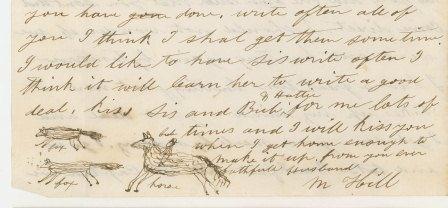By Susan Martin, Collection Services

A few weeks ago, I introduced you to Moses Hill of the 1st Massachusetts Sharpshooters, whose letters form part of the Frank Irving Howe, Jr. family papers. When we left Moses, in January 1862, his company was traveling along the C&O Canal. Unfortunately, weather and camp conditions were very poor, and illness became a major problem. Moses wrote to his wife Eliza: “I do not dred a Battle so much as I do sickness.” And with good reason: many soldiers died from typhoid and other diseases that winter.
However, each Union victory renewed Moses’ hope that the war would end soon and he would be home with his family by spring. His two children were growing fast. 13-year-old Lucina was now 5 feet and 1 inch tall, and Moses was impressed with the letters he received from her. The proud father bragged:
I think Lucina must of improved very much at school for she wrote me the best letter that she ever wrote before. I could not of believed she wrote so well as she wrote in that letter. I must say it was the best wrote letter that I have received since I left home.
His son George, or “Bub,” had been just two years old when his father left for the war, and Moses longed to see “the little fellow.” He drew pictures for Bub at the bottom of his letters, mostly rabbits, roosters, and other animals. In March 1862, Eliza sent him a photograph of their son, which he cherished:
I found a letter here when I got back to Camp. I found a great preasant in it. I found bubs picture. It is every thing to me. I shall kiss it every time I get a chance.
Moses’ homesickness is palpable. The separation from his family was both an emotional and a physical pain. And although the collection contains very few of the letters they sent to him, it’s clear the feeling was mutual. He assured his wife:
Dear Eliza you wrote that you dremped that I come home and I did not take any notice of you. Your Dream will never come to pass for if I come home or live to come home, and do not take notice of you and family I am mistaken. I think of home as much as you do of me and I think more. Why should I not out here in virginia. I think I ought to….You do not know what war is.
Moses had begun his military service, if not with enthusiasm, at least with optimism. But by March 1862, he had already taken part in many battles, and the war was taking its toll. He wrote: “I am sick of it. I want to come home I asure you but here we are.” On 27 Mar. 1862, the 1st Massachusetts Sharpshooters left for Yorktown, Va., where they would play a pivotal role in the month-long siege that spring. Please check back at the Beehive for the next installment of Moses Hill’s story.

